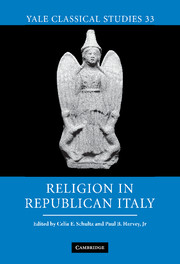Book contents
- Frontmatter
- Contents
- List of illustrations
- List of contributors
- Acknowledgments
- List of abbreviations
- Introduction
- Chapter 1 Reconsidering “religious Romanization”
- Chapter 2 In search of the Etruscan priestess: a re-examination of the hatrencu
- Chapter 3 Etruscan religion at the watershed: before and after the fourth century bce
- Chapter 4 Religious locales in the territory of Minturnae: aspects of Romanization
- Chapter 5 Religion and memory at Pisaurum
- Chapter 6 Inventing the sortilegus: lot divination and cultural identity in Italy, Rome, and the provinces
- Chapter 7 Hot, cold, or smelly: the power of sacred water in Roman religion, 400–100 bce
- Chapter 8 Religion and politics: did the Romans scruple about the placement of their temples?
- Chapter 9 Juno Sospita and Roman insecurity in the Social War
- Chapter 10 Beyond Rome and Latium: Roman religion in the age of Augustus
- Bibliography
- Index
Chapter 10 - Beyond Rome and Latium: Roman religion in the age of Augustus
Published online by Cambridge University Press: 08 January 2010
- Frontmatter
- Contents
- List of illustrations
- List of contributors
- Acknowledgments
- List of abbreviations
- Introduction
- Chapter 1 Reconsidering “religious Romanization”
- Chapter 2 In search of the Etruscan priestess: a re-examination of the hatrencu
- Chapter 3 Etruscan religion at the watershed: before and after the fourth century bce
- Chapter 4 Religious locales in the territory of Minturnae: aspects of Romanization
- Chapter 5 Religion and memory at Pisaurum
- Chapter 6 Inventing the sortilegus: lot divination and cultural identity in Italy, Rome, and the provinces
- Chapter 7 Hot, cold, or smelly: the power of sacred water in Roman religion, 400–100 bce
- Chapter 8 Religion and politics: did the Romans scruple about the placement of their temples?
- Chapter 9 Juno Sospita and Roman insecurity in the Social War
- Chapter 10 Beyond Rome and Latium: Roman religion in the age of Augustus
- Bibliography
- Index
Summary
INTRODUCTION: RELIGION AND IMPERIALISM
One of the main themes of this collection of essays is the impact of Roman institutions and practices on Italic society and the reciprocal impact of non-Roman institutions and practices on Roman custom. Other contributors to this volume (notably Glinister, Harvey, and Schultz) have explored the nature of this two-way exchange during the Republic, its extent and limitations. In general, Republican Rome can be characterized as voraciously absorbing others' gods. In part, this absorption – whether of Juno from Veii a few miles away, or of the Great Mother from distant Pessinus – reflects the Roman perception that religious practices and successful imperialism were inextricably linked. The eminent scholar Varro, who was reputed to have explained their own religion to the Romans, “claimed that gods worshipped in alien cities had agreed to become Roman gods because they recognized the superiority of those at Rome and because they recognized the superior religiosity of the Roman people. The structure of the divine world, for Varro, thus prescribed the order of the physical world where conquered cities looked to Rome for leadership.” The Augustan era, however, witnessed a shift in emphasis, with more and more gods being exported from Rome. This chapter explores how the capital's religious institutions and practices had a distinctive impact upon Italy during the age of Augustus.
One of Augustus' proud boasts was that he had unified Italy, and the slogan tota Italia (“united Italy”) formed a keystone of his claim to legitimate rule.
- Type
- Chapter
- Information
- Religion in Republican Italy , pp. 228 - 252Publisher: Cambridge University PressPrint publication year: 2006
- 5
- Cited by



